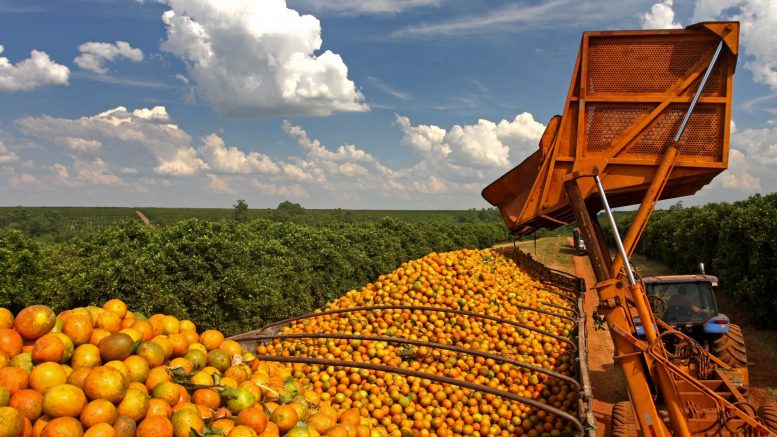“O futuro da citricultura paulista depende das ações de cada um do setor…”
Marcelo Pedreira de Miranda é pesquisador científico e coordenador da área de entomologia do Fundecitrus, professor do curso de mestrado profissional de fitossanidade MasterCitrus, membro do Comitê Técnico da Protecitrus e do Comitê Tático do Greening.
Miranda é engenheiro agrícola pela Universidade Federal do Recôncavo da Bahia, com mestrado e doutorado pela Esalq/USP.

Marcelo Pedreira, coordenador da área de entomologia do Fundecitrus
AgriBrasilis – O greening pode acabar com a citricultura no Estado de São Paulo?
Marcelo Miranda – Não. O cinturão citrícola que compreende o Estado de São Paulo, Triângulo/Sudoeste Mineiro é a principal região produtora de laranja e de suco de laranja do mundo.
O Estado de São Paulo é o principal parque citrícola do mundo, com alta produtividade. Hoje, mais de 80% do trabalho de pesquisa desenvolvido pelo Fundecitrus é voltado para o combate do avanço e controle da doença.
O futuro da citricultura paulista depende das ações de cada um do setor. Depende do citricultor, que deve adotar com rigor as medidas de controle. Depende do governo, que deve apoiar o setor e fiscalizar se as medidas estão sendo adotadas. E também depende dos pesquisadores, que precisam buscar soluções mais sustentáveis e efetivas de controle.
“Conter o greening em seu estágio inicial é decisivo para o sucesso”
AgriBrasilis – Como a doença é transmitida?
Marcelo Miranda – Em linha gerais, o greening é transmitido por um pequeno inseto, conhecido como psilídeo, que se alimenta da seiva de todas as variedades cítricas e da murta, ou dama-da-noite (Murraya paniculata). Ao se alimentar da planta doente, o psilídeo adquire a bactéria e passa a infectar outras plantas.
AgriBrasilis – Como combater o psilídeo e o greening?
Marcelo Miranda – Para manter uma região sem a doença, ou em patamares baixos de incidência, é muito importante que todos os estados adotem em suas legislações a obrigatoriedade de produção de mudas de citros em viveiros protegidos, de modo que cheguem aos pomares apenas mudas sadias.
É importante que se avalie rigorosamente a microrregião de plantio, eliminando ou substituindo plantas de citros que não recebem o controle adequado, ou seja, que possam servir como fonte de inóculo da bactéria que causa a doença, local onde o psilídeo se reproduz.
Havendo baixa incidência, é de extrema importância que as plantas doentes sejam eliminadas dos pomares comerciais, para impedir o alastramento da doença. Enquanto a incidência é baixa, o controle é mais fácil e impacta menos financeiramente o negócio. Além disso, o controle efetivo do psilídeo é fundamental para manter o greening em baixa incidência. Conter o greening em seu estágio inicial é decisivo para o sucesso. E as ações devem ser adotadas conjuntamente, por todos os citricultores de uma determinada região. Daí a importância da conscientização.
AgriBrasilis – Quais são os inseticidas mais eficientes contra esse inseto? E o controle biológico?
Marcelo Miranda – O Fundecitrus coordena a lista da ProteCitrus, responsável por listar produtos autorizados para uso no campo com base nas exigências dos mercados consumidores. Sabemos que, com base em pesquisa, alguns inseticidas do grupo dos piretróides, neonicotinoides e, mais recentemente, a malationa, que pertence ao grupo químico dos organofosforados, não estão apresentando eficácia adequada no controle do psilídeo, devido a resistência do inseto a esses produtos. O uso em rotação de inseticidas com diferentes modos de ação apresenta os melhores resultados no controle do inseto.
O Fundecitrus disponibiliza para o citricultor uma ferramenta chamada “Avalia Psilídeo”, que permite que o produtor consulte os resultados da eficácia dos inseticidas para o controle do psilídeo em diferentes regiões do cinturão citrícola. Assim, a ferramenta auxilia o citricultor na hora de escolher os produtos adequados para usar no pomar.
Além dos inseticidas químicos, os inseticidas biológicos estão sendo estudados. Em breve o Fundecitrus disponibilizará os resultados dessa pesquisa.
O uso repetitivo de inseticidas sem a rotação adequada dos modos de ação resultou na seleção de psilídeos resistentes. O crescimento populacional do psilídeo no cinturão citrícola de SP está principalmente relacionado ao uso repetitivo e sem rotação adequada de produtos do grupo químico dos piretróides, neonicotinoides e, mais recentemente, do grupo químico dos organofosforados.
AgriBrasilis – Existem diferenças na eficácia dos produtos dependendo da região citrícola e da população de psilídeos? Por quê?
Marcelo Miranda – De forma geral, é possível ver na plataforma do “Avalia Psilídeo” que a eficácia dos produtos mantém um padrão em todas as regiões do parque citrícola. Contudo, dentro de uma mesma região pode existir diferença na eficácia de um determinado produto.
Em regiões de expansão, como nos Estados de MS ou MG, onde há menor densidade de pomares e baixas populações de psilídeos, o comportamento dos inseticidas pode ser diferenciado, já que há menor probabilidade de estar ocorrendo a resistência aos grupos químicos citados. Assim, é muito importante que nessas áreas seja realizada a rotação adequada de inseticidas para que a resistência não seja um problema no futuro.
AgriBrasilis – Quais são os resultados da aplicação de neonicotinoides via “drench” para controle dessa praga?
Marcelo Miranda – Em setembro, o Fundecitrus divulgou resultados preliminares sobre a aplicação de neonicotinoides via drench. Na ocasião, os testes realizados em uma propriedade de Casa Branca, SP, mostraram que a eficiência das moléculas para esse tipo de aplicação foi baixa (mortalidade de adultos do psilídeo menor que 40%).
A pesquisa avançou e novas avaliações foram realizadas. Como os resultados representam a realidade apenas dos locais onde a pesquisa foi feita, essa eficiência não pode ser generalizada para toda a região. A manutenção ou restabelecimento da alta eficiência dos neonicotinoides vai depender da rotação correta dentro da propriedade e nas propriedades vizinhas.
AgriBrasilis – O que é a ferramenta “Avalia Psilídeo” e quais são seus benefícios para os citricultores? Que outros projetos da Fundecitrus estão em curso?
Marcelo Miranda – Lançada em janeiro de 2024, a ferramenta “Avalia Psilídeo” é fruto de um trabalho de cooperação que envolveu o citricultor e vários setores do Fundecitrus, passando pelas equipes de Transferência de Tecnologia, que realiza as coletas do inseto, a equipe de P&D, responsável pelos experimentos com os psilídeos, etc.
Saber quais produtos apresentam melhores eficácias localmente é importante e contribuirá para o manejo do greening. A missão do Fundecitrus sempre foi orientar e informar o citricultor sobre as questões que envolvem as boas práticas fitossanitárias.
Com o avanço do greening nos pomares, o Fundecitrus redobrou suas ações no campo, com ações de comunicação, treinamentos, palestras, reuniões com produtores, ações externas e nas pesquisas. Nossos pesquisadores e nossa equipe de agrônomos estão constantemente conversando com os produtores e alertando sobre as medidas de prevenção. O Avalia Psilídeo é mais uma forma de atuarmos na conscientização e na disseminação da informação.
LEIA MAIS:

